

 |
Verse 256. The Just And The Impartial Judge Best
Explanation: If for some reason someone were to judge what is right or wrong, arbitrarily, that judgment is not established on righteousness. But, the wise person judges what is right and what is wrong discriminately, without prejudice. |
 |
Verse 257. Firmly Rooted In The Law
Explanation: That wise person, who dispenses justice and judges others, impartially, without bias, non-arbitrarily, is guarded by and is in accordance with the Law of Righteousness. Such a person is described as well established in the Dhamma. |
 |
Verse 258. Who Speaks A Lot Is Not Necessarily Wise
Explanation: A person cannot be described as learned simply because he speaks quite a lot. He who is liberated and secure, non-hating and fearless is described as a learned person. |
 |
Verse 259. Those Who Know Speak Little
Explanation: One does not become an upholder of the Law of Righteousness merely because one talks quite a lot. Even if one, though he has heard only a little, experiences the Dhamma by his body and is diligent, he is the true upholder of the Dhamma. |
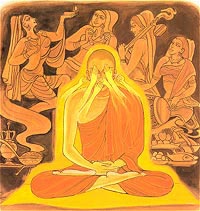 |
Verse 260. Grey Hair Alone Does Not Make An Elder
Explanation: One does not become an elder merely because one’s hair has turned grey. One, who is only old in years, has grown ripe uselessly. |
 |
Verse 261. The Person Full Of Effort Is The True Elder
Explanation: All things that men do arise out of the mind. The words and deeds of men spring from their minds. Sometimes, their mind are blemished - evil. If they speak or act with an evil mind, the inevitable result is suffering. Wherever they go, this suffering will follow them. They cannot shake off this suffering. This is very much like the wheel of the cart that follows the steps of a draught bull yoked to the cart. The bull is perpetually bound to it. |
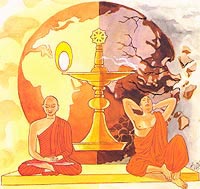 |
Verse 262. Who Gives Up Jealousy Is Good-Natured
Explanation: Merely because of one’s verbal flourishes, impressive style of speaking, or the charming presence, a person who is greedy, envious and deceitful, does not become an acceptable individual. |
 |
Verse 263. Who Uproots Evil Is The Virtuous One
Explanation: If an individual has uprooted and eradicated all these evils and has got rid of blemishes, such a person is truly an acceptable person. |
 |
Verse 264. Shaven Head Alone Does Not Make A Monk
Explanation: Can an individual who does not practice religion, speaks untruth, and is filled with desire and greed, become an ascetic, merely because he is shaven-headed? |
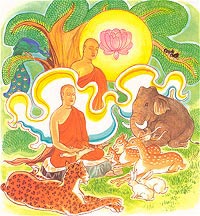 |
Verse 265. Who Give Up Evil Is True Monk
Explanation: If an individual were to quell all defilements, big and small, he is described as an ascetic - a samana. |
 |
Verse 266. One Is Not A Monk Merely By Begging Alms Food
Explanation: No one becomes a monk merely because he begs others. An individual, though begging , does not become a monk if he embraces vicious and repulsive beliefs. |
 |
Verse 267. The Holy Life Makes a Monk
Explanation: Who rises above both good and evil and treads the path of higher discipline, reflecting wisely , that person, indeed, deserves to be described as a monk. |
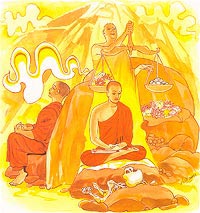 |
Verse 268. Silence Alone Does Not Make A Sage
Explanation: The ignorant person, possessing foolish ways and seemingly bewildered, may practice silence - the austerities of the munis. But this does not make him a sage. But the wise person, like someone holding scales, weighs good and bad and selects what is noble. |
 |
Verse 269. Only True Wisdom Makes a Sage
Explanation: Weighing what is right and wrong, he shuns evil. For he is a sage (muni). He is capable of weighing both worlds through his sagely wisdom. |
 |
Verse 270. True Ariyas Are Harmless
Explanation: A person who hurts living beings is not a noble human being. The wise person, who does not hurt any living being is called ariya, a noble individual. |
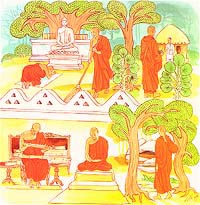 |
Verse 271. A Monk Should Destroy All Passions
Explanation: These two stanzas are an admonition to the monks making an effort to reach the state of blemishlessness - Nibbana. They are asked not to slacken their effort to win liberation by being content with some achievement which only pave the way to the final goal. |
 |
Verse 272. Blemishes Should Be Given Up To Reach Release
Explanation: Monks, do not rest content by precepts and rites. Do not be content with extensive learning, Nor should you feel satisfied by achieving states of mental trance. Do not rest content with seclusion, assuring yourself "I have experienced the joy of renunciation not possible for the ordinary." Do not slacken your effort until you have attained Nibbana. |
| |
|
|
| |
|
|
| |
|
| |
|
|
|
|
|
|
|